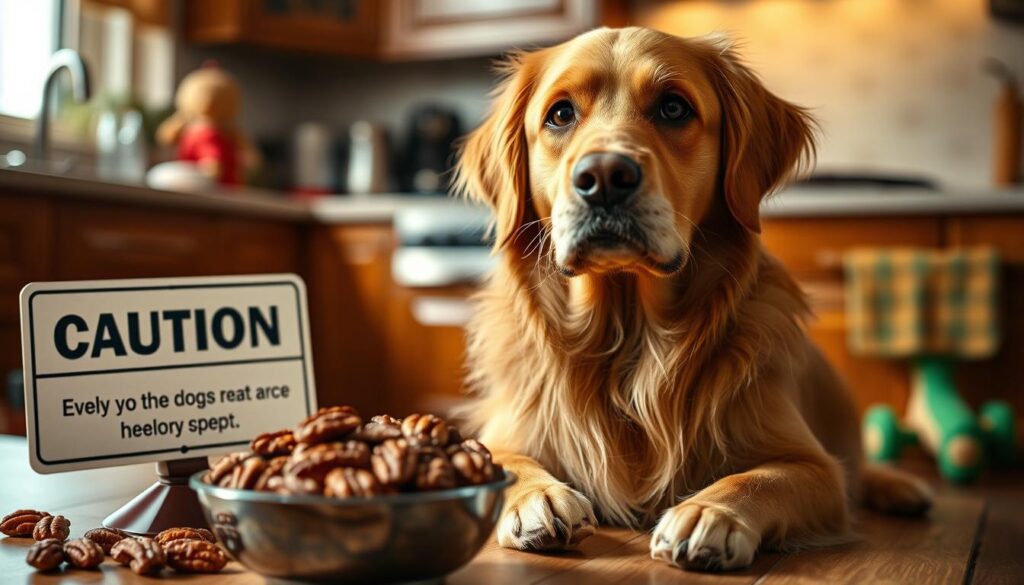Table of Contents
- Understanding Pecan Toxicity in Dogs
- The Hidden Dangers of Pecans for Dogs
- Can Dogs Eat Pecans: The Straightforward Answer
- Signs Your Dog Has Eaten Pecans
- Immediate Steps If Your Dog Consumes Pecans
- Health Complications from Pecan Consumption
- Safe Nut Alternatives for Your Canine Companion
- Preventing Access to Pecans: Safety Tips
- Natural and Healthy Treats for Dogs
- Conclusion
- FAQ
Can Dogs Eat Pecans ? Ever wondered if pecans are safe for your dog? Many pet owners ask this question. It’s important to know if these nuts are safe for our furry friends.
Dogs can’t eat just any human food. Pecans are especially risky. So, are they safe for dogs? The answer might surprise you.
This guide will tell you why pecans are bad for dogs. We’ll look at the science behind the risks. This will help you make better choices for your dog’s diet and health.
Key Takeaways
- Pecans are NOT safe for dogs to consume
- Potential health risks include digestive issues and toxicity
- Some nuts can cause serious medical complications
- Always consult a veterinarian about pet nutrition
- Prevention is key to protecting your dog’s health
Understanding Pecan Toxicity in Dogs
Pet owners need to know the dangers of dogs eating pecans. Pecans might seem safe, but they can harm dogs. The chemicals in pecans can cause serious health problems.

Dogs digest food differently than humans. Pecans have compounds that can hurt dogs.
Chemical Compounds in Pecans
The main worries with pecans are:
- Juglone: A toxic compound that can cause digestive issues
- Mycotoxins: Dangerous fungal substances that grow on nuts
- High fat content: Can lead to pancreatitis in dogs
Natural Toxins Present
Pecans have toxins that are harmful to dogs. Aflatoxin is especially dangerous. It can damage a dog’s liver.
| Toxin | Potential Health Impact |
|---|---|
| Juglone | Digestive system disruption |
| Aflatoxin | Liver damage |
| Mycotoxins | Neurological complications |
Impact on Canine Digestive System
Eating pecans can harm a dog’s digestive system. It can lead to long-term problems like blockages and inflammation.
“Prevention is always better than cure when it comes to protecting your dog’s health.” – Veterinary Nutrition Experts
Dog owners should watch out. Even a little bit of pecans can be dangerous for their pets.
The Hidden Dangers of Pecans for Dogs
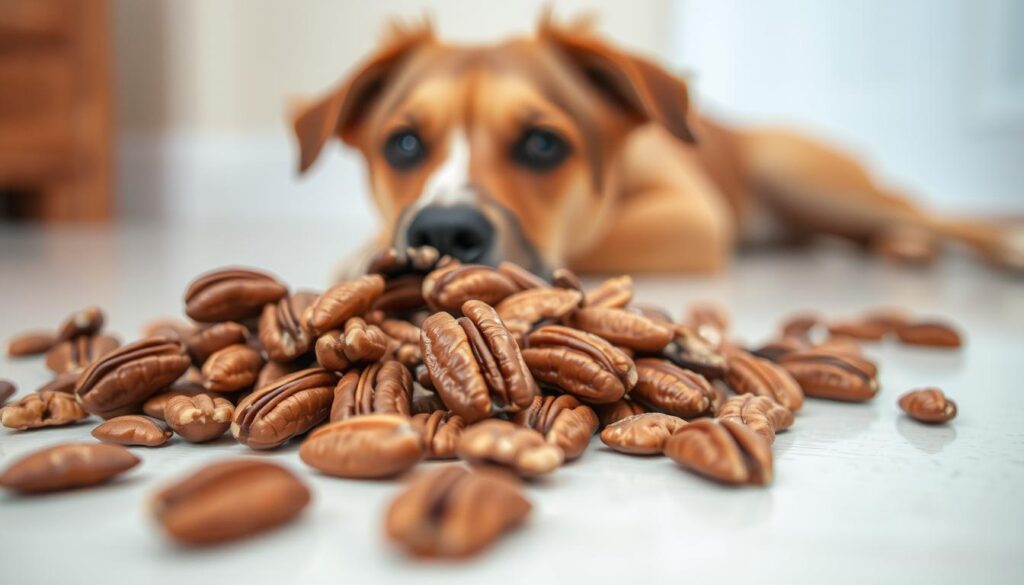
Pet owners need to know the risks of pecans for dogs. These risks go beyond just stomach problems. Pecans can pose serious dangers to your dog’s health.
The dangers of dogs eating pecans are many. They can lead to serious health issues:
- Potential mycotoxin contamination
- Risk of intestinal blockages
- Susceptibility to pancreatitis
- Potential neurological complications
Mycotoxins are a big threat in pecans. These toxins can cause serious brain problems in dogs. They can lead to long-term health issues.
“Prevention is always better than cure when it comes to your dog’s nutrition.” – Veterinary Nutrition Expert
Dogs are more at risk from pecans because of their digestive systems. The high fat and toxic compounds can cause severe reactions. These reactions might not show up right away.
| Pecan Danger | Potential Dog Health Impact |
|---|---|
| High Fat Content | Pancreatitis Risk |
| Mycotoxin Exposure | Neurological Complications |
| Mold Contamination | Digestive System Disruption |
Pet owners should watch out for pecans and dogs. Knowing these dangers can help prevent serious health issues. It keeps your furry friend healthy for a long time.
Can Dogs Eat Pecans: The Straightforward Answer
Pet owners often wonder about the safety of various human foods for their canine companions. When it comes to pecans and canine health, the answer is clear: dogs should not eat pecans under any circumstances.
The risks associated with pecans for dogs are significant and multifaceted. Pecans contain several dangerous elements that can potentially harm your furry friend’s health.
Raw vs. Roasted Pecans: No Safe Option
Contrary to popular belief, neither raw nor roasted pecans are safe for dogs. The key concerns include:
- High fat content that can cause pancreatitis
- Potential mold growth containing dangerous mycotoxins
- Risk of intestinal blockage
Choking and Size Hazards
Pecans pose serious choking risks for dogs, especially smaller breeds. Their irregular shape and hard texture can easily become lodged in a dog’s throat.
| Pecan Risk Factor | Potential Consequence |
|---|---|
| Size and Shape | Choking hazard |
| Hardness | Dental damage |
| Mold Potential | Toxic poisoning |
Portion Considerations: Zero Tolerance
When it comes to can dogs eat pecans, veterinarians unanimously recommend zero pecans. Not a single nut is considered safe for canine consumption.
“Prevention is always better than cure when it comes to your dog’s nutrition.” – Veterinary Nutrition Experts
If you’re seeking healthy treats for your dog, consult with your veterinarian for safe, nutritious alternatives that support canine health.
Signs Your Dog Has Eaten Pecans
It’s important for pet owners to know the signs of pecan poisoning in dogs. Dogs can show distressing reactions after eating pecans. These reactions need quick attention and vet care.

The symptoms of pecan poisoning in dogs can appear fast and be serious. Watch for these warning signs:
- Persistent vomiting
- Diarrhea with potential blood presence
- Abdominal pain or swelling
- Lethargy and weakness
- Loss of appetite
Neurological symptoms may also develop, including:
- Tremors or muscle weakness
- Disorientation
- Potential seizures
“Early detection of symptoms of pecan poisoning in dogs can be life-saving for your furry companion.” – Veterinary Nutrition Experts
The severity of symptoms depends on several factors. These include how many pecans were eaten and the dog’s size and health.
| Symptom Category | Typical Indicators | Urgency Level |
|---|---|---|
| Digestive Distress | Vomiting, Diarrhea | High |
| Neurological Signs | Tremors, Disorientation | Critical |
| Physical Weakness | Lethargy, Reduced Mobility | Moderate to High |
If you see any symptoms of pecan poisoning in dogs, call your vet right away. Quick action can stop serious health problems.
Immediate Steps If Your Dog Consumes Pecans
Discovering your dog has eaten pecans can be stressful. Knowing what to do can make a big difference in their health. Quick action is key to keep your pet safe.

When your dog eats pecans, act fast. Pecan toxicity can be serious. Knowing the immediate steps is crucial for your pet’s safety.
Emergency Veterinary Care Protocol
If you think your dog ate pecans, call your vet right away. They can guide you on managing health risks. Tell them:
- How many pecans your dog ate
- When they ate them
- Any symptoms your dog is showing
- Your dog’s size and breed
Home Monitoring Strategy
While waiting for vet advice, watch your dog closely. Look for these signs:
- Vomiting or diarrhea
- Lethargy or weakness
- Abdominal pain or discomfort
- Changes in urination
“Swift action and careful observation can prevent serious health complications for dogs who have eaten pecans.” – Veterinary Emergency Specialists
Essential Documentation for Veterinary Consultation
Get ready for your vet visit by gathering important info:
- Exact time of pecan consumption
- Estimated amount eaten
- Any symptoms you’ve seen
- Recent health history
Remember: Don’t make your dog vomit without a vet’s say-so. Each case needs a personal medical check.
Health Complications from Pecan Consumption
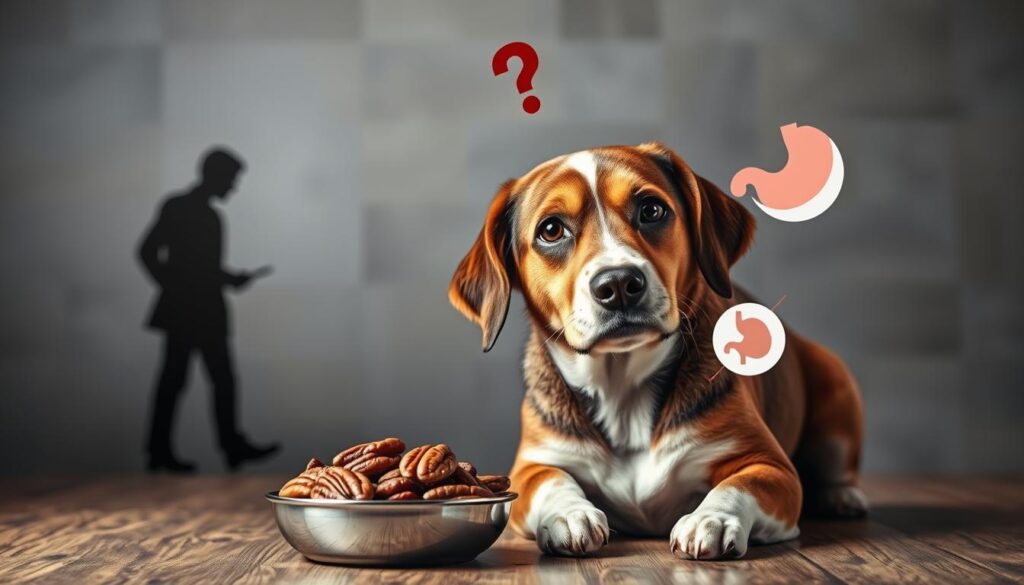
Pecans can be very harmful to dogs. They can cause a range of health problems, from mild stomach issues to serious body-wide issues.
The dangers of dogs eating pecans are many:
- Digestive Tract Disruption: Pecans have a lot of fat, which can upset a dog’s stomach right away
- Pancreatitis Risk: Eating too many nuts can cause serious inflammation in the pancreas
- Potential Liver Damage: Pecans contain toxins that can harm a dog’s liver
- Intestinal Blockage: Whole pecans can block a dog’s intestines
Vets say dogs can show many symptoms if they eat pecans. These include vomiting, diarrhea, belly pain, and even brain problems.
“Even small amounts of pecans can trigger significant health complications in canines,” says Dr. Emily Richardson, veterinary nutritionist.
Long-term, dogs might face metabolic problems, chronic digestive issues, and trouble absorbing nutrients. Owners should watch out and see a vet if they think their dog ate pecans.
Safe Nut Alternatives for Your Canine Companion
Pet owners looking for safe nuts for dogs have many tasty and healthy options. Pecans are risky, but other nuts can be good treats in small amounts.
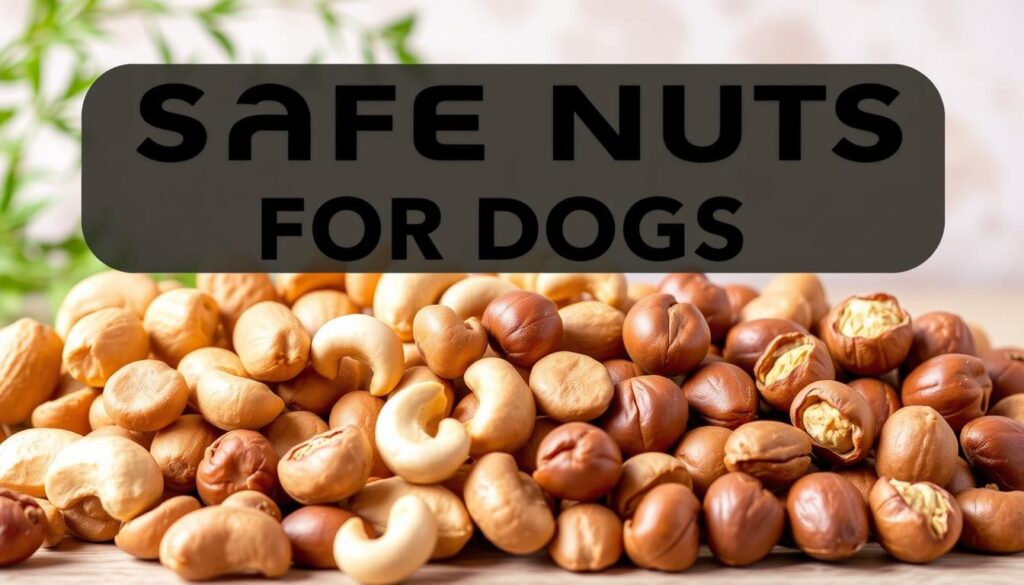
Vets suggest some nuts that are safe for dogs. These can be good additions to your dog’s diet.
Veterinarian-Approved Nuts
- Almonds (unsalted and in small quantities)
- Cashews (roasted, unsalted)
- Peanuts (without shell, unsalted)
Proper Serving Methods
Adding nuts to your dog’s diet needs careful thought. Here are some tips:
- Chop nuts into small pieces to prevent choking
- Limit portion sizes to less than 10% of daily caloric intake
- Introduce new nuts gradually to monitor digestive response
Nutritional Benefits
Safe nuts can be very good for dogs. They offer many health benefits when given right.
| Nut Type | Key Nutrients | Health Benefits |
|---|---|---|
| Almonds | Vitamin E, Magnesium | Supports skin health, immune function |
| Cashews | Protein, Zinc | Muscle development, metabolism support |
| Peanuts | Protein, Healthy Fats | Energy boost, coat conditioning |
“Always consult your veterinarian before introducing new foods to your dog’s diet.” – Veterinary Nutrition Experts
Remember, every dog is different. Moderation and careful observation are crucial when giving safe nuts to dogs.
Preventing Access to Pecans: Safety Tips
To keep your dog safe from pecans, you need to act early. Start by making your home a safe place and setting clear rules for everyone. This is the first step in preventing dogs from eating pecans.
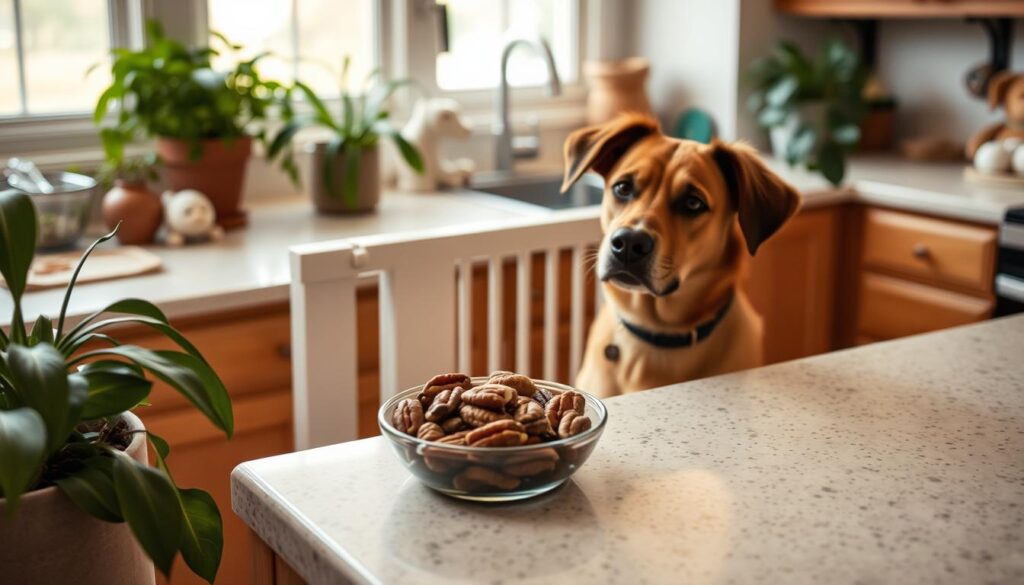
Dogs are always curious and might try to get pecans from anywhere. A good plan can help lower the chance of them eating pecans by accident.
- Store pecans in sealed, high cabinets inaccessible to dogs
- Use childproof locks on pantry doors
- Train family members about pecan dangers
- Keep pecan trees in yards fenced or monitored
- Clean up fallen pecans immediately during harvest season
Creating a pecan-free zone needs everyone’s effort and teamwork. Dogs can’t tell the difference between safe and dangerous nuts. So, stopping them from eating pecans is very important.
“Prevention is always better than treatment when protecting our canine companions from potential health risks.” – Veterinary Nutrition Experts
When you’re outside, keep a close eye on your dog. Pecans can fall from trees or be found in parks, posing a risk.
| Prevention Strategy | Effectiveness |
|---|---|
| Sealed Storage | High |
| Family Education | Medium-High |
| Yard Monitoring | High |
| Regular Cleanup | Very High |
Always be careful to prevent dogs from eating pecans. By following these steps, you can make a safe space for your pet. This will protect them from health dangers.
Natural and Healthy Treats for Dogs
Exploring dog-friendly alternatives to pecans reveals a treasure trove of healthy treats for your pet. These options are not only safe but also offer a boost to your dog’s health and happiness.
Looking for safe alternatives to pecans? Here are some nutritious choices:
- Fresh Fruits: Blueberries, watermelon, and apple slices (without seeds) are great low-calorie treats
- Vegetable Snacks: Carrots, green beans, and sweet potato chunks offer crunch and nutrients
- Protein-Rich Options: Cooked chicken, turkey, or small pieces of lean meat
“The best treats are those that complement your dog’s nutritional needs while providing mental stimulation.” – Veterinary Nutrition Expert
Making homemade dog treats is a fun and safe way to avoid harmful nuts like pecans. Simple recipes with pumpkin, banana, or plain yogurt are tasty and safe for dogs.
Always introduce new treats slowly and in small amounts. Every dog is different, so it’s best to talk to your vet about the right treats for your pet.
Conclusion
It’s important to know the dangers of pecans for dogs. Pecans might look harmless, but they can be very dangerous. The chemicals in them can harm your dog.
Vets say it’s best to keep dogs away from pecans. The risks of eating them are too high. Instead, choose safe treats that are good for your dog.
Keeping your dog safe from pecans is key. Make sure they can’t get to them. Teach others about the dangers too. Always talk to a vet about what’s safe for your dog to eat.
Good pet care means making smart choices about food. Knowing about pecans and dogs helps keep your pet healthy. You can make a safer place for your dog by being informed.
FAQ
Are pecans toxic to dogs?
Yes, pecans are toxic to dogs. They contain a compound called juglone that can harm them. Pecans may also have mold that produces dangerous toxins. Eating pecans can cause digestive problems, blockages, and serious health issues.
What symptoms should I watch for if my dog eats pecans?
Look for vomiting, diarrhea, and stomach pain. Also, watch for lethargy, loss of appetite, and neurological signs. Severe cases might include tremors or seizures. If you see these signs, call your vet right away.
Can dogs eat even a small number of pecans?
It’s best to keep dogs away from pecans. Even a little can upset their stomach, cause choking, or introduce toxins. The risks are too high, so it’s safer to keep pecans out of their diet.
What should I do if my dog accidentally eats pecans?
First, take away any pecans your dog might find. Watch them for vomiting or odd behavior. If they’ve eaten a lot or act strangely, call your vet. Tell them how many pecans your dog ate.
Are there any safe nuts for dogs?
Some nuts are okay in small amounts. Peanuts and cashews (without shells and salt) can be treats. But, always check with your vet first. Start with tiny amounts to make sure they’re safe.
How can I prevent my dog from accessing pecans?
Keep nuts in closed containers and high places. Be careful when walking near pecan trees. Teach family members about the dangers. Use pet-proof containers and sealed trash cans. Teach dogs to leave food alone.
Can pecan shells be dangerous to dogs?
Yes, pecan shells are very dangerous. They can block the intestines, cause cuts, and lead to serious problems. The sharp edges can also choke or hurt your dog inside.
Are roasted pecans safer than raw pecans?
No, roasting doesn’t make pecans safe for dogs. Roasted pecans still have the same dangers as raw ones. Roasting doesn’t remove the toxic compounds that make pecans harmful.
